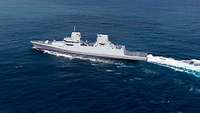Class 126 frigate – self-sufficient power supply by means of batteries
Technology- Date:
- Reading time:
- 3 MIN


The construction start for the first frigate of class 126 is drawing closer; preparation work is in full swing. To ensure a self-sufficient power supply for the vessels, a team of the Federal Office of Bundeswehr Equipment, Information Technology and In-Service Support (BAAINBwBundesamt für Ausrüstung, Informationstechnik und Nutzung der Bundeswehr) tested the battery technology to be used.

This is what the new F126 class will look like
DAMEN NavalThe state-of-the-art vessels of the 126 frigate class, the first of which is to be delivered in 2028, have a sophisticated energy concept. In addition to four power generating aggregates, two shaft generators are installed, which can be used to generate electrical energy. This assembly is supplemented by four battery modules equipped with special lithium batteries.
This may not sound like much, but these batteries actually mean great charging power: The ones used on the F126 vessel can store as much energy as 14 commercial electric cars. A major advantage of the technology used is the long useful life of the batteries. This feature is of particular importance when the batteries are used on a frigate because the energy supply concept provides that peak demands on the power grid are to be backed up by the energy stored in the batteries. Thus, a constant supply of energy can be ensured.
The batteries will be charged as long as the power generating aggregates are not yet fully utilized. This approach also improves the efficiency of the entire energy system on the frigates. During normal operation, the batteries are discharged only to the extent that sufficient energy is available at all times to ensure supply of the vessel even in case of power loss.
There is no technical system that offers only advantages. Due to the design of the lithium batteries used, there is an increased fire hazard on board.
The S8 group of BAAINBwBundesamt für Ausrüstung, Informationstechnik und Nutzung der Bundeswehr, which is responsible for project implementation, is therefore working intensively on the safety of the battery modules intended for the frigates in cooperation with a team of the Bundeswehr Technical Center for Land-Based Vehicle Systems, Engineer and General Field Equipment (WTDWehrtechnische Dienststelle 41) and the Fraunhofer Institute for Chemical Technology (ICT).
While WTDWehrtechnische Dienststelle 41 has been conducting experiments to test the useful life of the battery module under realistic operating conditions, a series of tests has been conducted at ICT since August 2023 to examine the safety of the batteries. The aim of these tests is to assess the risk of a so-called thermal propagation in the event of overheating of a battery cell within the battery module.

The test setup for battery trials at the Fraunhofer Institute
Bundeswehr/Stefan RamrothWhat does that mean? In the case of thermal propagation, the overheating cell transmits so much energy to the adjacent cells that they are also triggered to overheat. This results in a chain reaction in the battery system. However, it is crucial whether this process continues or not. If the adjacent cells do not react or if they are able to reduce the resulting overpressure in a controlled manner, such an incident can be easily dealt with by taking appropriate safety measures.
Since a frigate is designed for threat scenarios in which major damage to the batteries may occur, the battery rooms are additionally equipped with specially adapted fire extinguishing systems and constructive area protection measures.
A suitable exhaust system, which detects leaking gases and is able to quickly carry them off, is to ensure, for example, that no explosive gas mixture can form within the battery room. In order to avoid the need for this system at all, the battery modules are monitored accordingly and are disconnected from the network immediately in case of irregularities.
The responsible personnel of Fraunhofer ICT reported that the first trial conducted to study the risk of thermal propagation was promising, but it also showed potential for further optimization. No propagation was observed. Only the extremely overloaded cells were destroyed and two of the surrounding cells were slightly damaged. Further tests were already planned.
The persons in charge were pleased that the F126 project had again reached a milestone in the development phase, and thus an important step on the way to the start of production of the frigate.
by Andreas Büsken, Stefan Ramroth, Patrick Janta